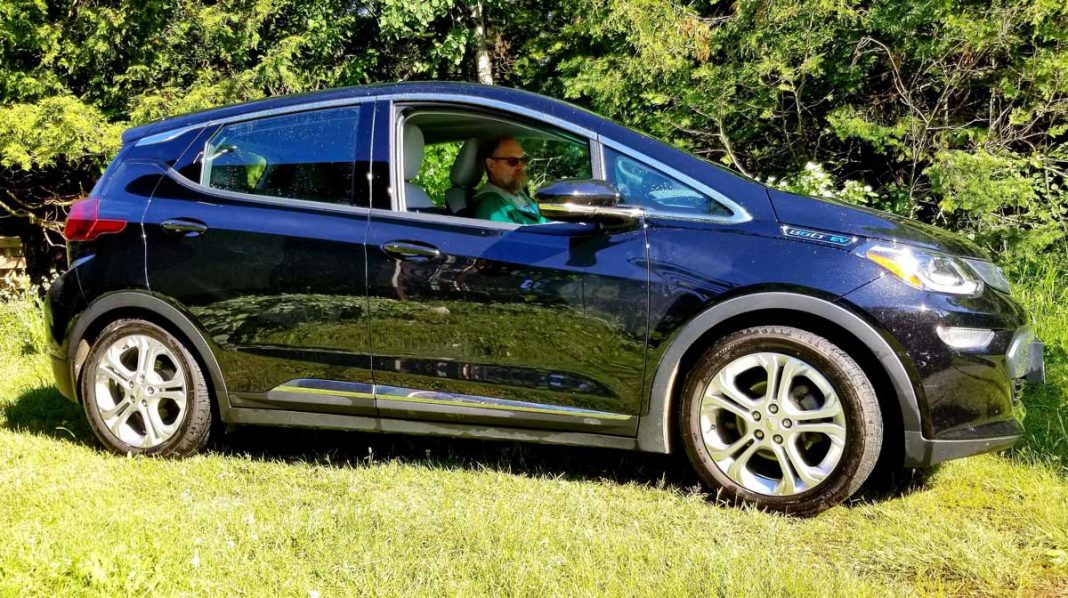HONORA BAY—Transportation is the second largest contributor to greenhouse gas emissions in Canada, only just behind the oil and gas sector. Canadians are beginning to see more electric vehicles (EVs) on the road as individuals look for ways to reduce their personal carbon footprint. While there is still a large gap between sales of EVs and standard fossil fuel powered vehicles, the market share for EVs has increased, again, in 2019, according to a report by Electric Mobility Canada (EMC) which notes that sales of EVs in Canada have now surpassed 100,000.
An EV is a good option, said Gary Fuhrman of Honora Bay, even in a Northern Ontario winter. Mr. Fuhrman and his wife, Pam Jackson, purchased a Chevrolet Bolt one year ago.
The EV is important for both economic and ecological reasons, Mr. Fuhrman said. “Just like our investment in the solar power system that allowed us to go off-grid several years ago, buying into it was expensive up-front, but saves a ton of money afterwards.”
The Bolt costs $44,800 before the $5,000 rebate from the federal government (an Ontario rebate was cancelled by the current government) but maintenance costs are minimal and, of course, there is no cost for gasoline. There’s also no engine so no oil changes and no cooling system maintenance. EVs don’t have an exhaust system either. “We do have to rely on hydro to power the car in winter but it’s still a lot cheaper than gas for the same amount of range,” he said.
The ecological reasons for buying an EV were even more compelling. “We need to break our addiction to fossil fuels and learn to get along with less consumption of energy,” Mr. Fuhrman stated. “We’ve all been trained to be consumers but now we need to be conservers. EVs are not the whole solution, of course. Our EV is a small part of the energy transition we are living through in order to slow down the global heating which is already killing people and ecosystems everywhere.”
On a full charge and in summer driving conditions, the Fuhrman-Jackson car has a 400 km range when fully charged. That drops to 280 km in the winter; cold batteries do not perform as well, although that is similar for gasoline powered vehicles. Heavy use of interior heating or air conditioning can also reduce mileage significantly.
There are three levels of charging plugs. Level one plugs into any standard three-pronged outlet but offers a slow charge, providing five to eight km per hour of charging time. Most owners will leave their EVs plugged in overnight with this plug. Level two offers a faster charge, closer to 50 km per hour. It does need a 240V outlet and that can cost approximately $1,000 to install. The cost to charge varies but averages around $1 per hour in a typical home or public charger. Level three is good for a long trip, offering the quickest charge but at a higher cost.
There are charging stations within range of Manitoulin. There is one at Northern Ford in Espanola; PetroCanada at Four Corners in Sudbury has one, and there are two charging stations located at the Georgian Bay Travel Centre outside of Parry Sound. There is also a charging station now located at Huron Sands in Providence Bay.
The Fuhrman-Jacksons took a trip to Toronto last January. The Bolt handles just fine with winter tires, Mr. Fuhrman said. “The only difference from a gas burning car is that the EV can accelerate much faster so you need a light foot on the accelerator when the road is icy. The EV’s range is shorter in cold weather though.”
They stopped at Sudbury and Georgian Bay on their journey, and with 80 km left in range they reached Toronto, only to come to a standstill in the midst of a typical Toronto traffic jam. This leads to another benefit of the EV: when the car is not moving, it’s not using the battery. They arrived at their Air BnB with 70 km to spare.
The regeneration feature (all EVs have these) means that energy is captured during braking and used to charge the battery. A paddle shifter on the steering column allows for maximum regeneration by controlling the braking, allowing the car to slowly come to a complete stop without the driver touching the brake pedal. “It’s an energy conserving feature, so it’s even more helpful in winter,” said Mr. Fuhrman. “Using it instead of the brakes to slow down the car doesn’t cause a skid because the slowdown is gradual.”
While the Fuhrman-Jacksons are very happy with their Bolt, EV sales in Ontario have actually dropped at the same time they are rising in other parts of the country, most notably in Quebec and British Columbia. According to EMC the main reason for the drop in Ontario was the cancellation of the government financial incentive. The starting price for EVs is around $35,000, so although there are significant savings on gas and maintenance, the up-front cost is higher. It may take five to seven years to come out ahead compared to purchasing a new gasoline powered vehicle. Recent reports suggest it will be another three years before there is price parity between EVs and gasoline powered vehicles.
Another issue is the current lack of options. There are five main contenders in the Canadian market. The Bolt ranks second in sales, behind the Nissan Leaf. For those who like their trucks, Ford is working on an electric pickup similar to its F150 line. Tesla also has a truck model in the works. For those who find the silence of an EV off-putting, there are companies working on a variety of aftermarket soundmakers, including one that mimics the roar of a truck.
The Fuhrman-Jacksons enjoy their quiet Bolt though. “It’s the quiet and the zippy acceleration that makes it fun,” Mr. Fuhrman said. “Especially when you need to pass a slow truck on Hwy 6 and don’t have a lot of room. The EV can zoom around it in seconds.”
An EV purchase was already in their future but later, when their 2010 Honda hybrid wore out, he said. “My wife Pam took a test drive in the Bolt last spring and she couldn’t wait to buy it because it was such fun to drive.”
There are many other EV options available besides the Bolt, such as the Ford Focus Electric, Hyundai IONIQ Electric, Hyundai KONA Electric, Volkswagen e-Golf, Toyota Prius plus many high-end models, not to mention the many hybrid vehicles on the market, including from all the major domestic brands.






